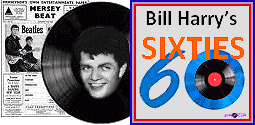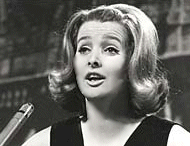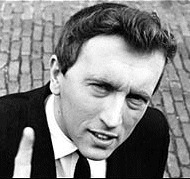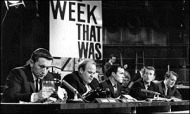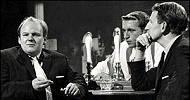|
|
The scripts were written by journalists rather than scriptwriters and
included Dennis Potter, Kenneth Tynan, John Mortimer, Keith Waterhouse
and Willis Hall, Peter Shaffer and Christopher Booker while the taboo
subjects they covered included racism, royalty and religion.
The new permissive image which ‘TW3’ (as it came to be known) projected,
introduced satirical comment on the week’s events in songs and sketches
and there were abrasive interviews conducted by Bernard Levin.
The show was fronted by David Frost, a minister’s son from Beccles,
and other residents included William Rushton, Levin, Lance Percival,
Roy Kinnear, Kenneth Cope, John Bird, Eleanor Bron, Al Mancini, John
Wells, Timothy Birdsall and Roy Hudd.
The show opened with Millicent Martin singing a theme song which incorporated
the week’s events, always beginning: “That was the week that was. It’s
over - let it go.” One Anglican clergyman called Millicent, “a repulsive
woman with a grating voice.”
TV watchdog Mary Whitehouse said the programme was “the epitome of what
was wrong with the BBC – anti-authority, anti-religious, anti-patriotism,
pro-dirt, and poorly produced, yet having the support of the Corporation
and apparently impervious to discipline from within or disapproval from
without.” Yet the programme didn’t withstand disapproval from without
and, despite its success, was taken off the air in 1963. The official
reason given was that 1964 was election year and there was a fear that
the show might influence voters.
‘That Was The Week That Was’ ran from November 1962 until April 1963
and from September to December 1963. The last show was screened on 27th
December and it was taken off the air 13 weeks earlier than planned.
When it was pointed out that not only was 1964 election year, but also
the year in which Parliament was to debate the renewal of the BBC’s
charter, Carleton Greene commented, “It was in my capacity as a subversive
anarchist that I yielded to the enormous pressure from my fellow subversives
and put TW3 on the air; and it was as a pillar of the Establishment
that I yielded to the Fascist hyena-like howls to take it off again.”
Frost took TW3 to America in 1964, maintaining the basic British format,
but losing much of the programme’s satire and bite. The TW3 girl who
sang the theme song each week was Nancy Ames and other members of the
cast, in a show hosted by Frost, included Henry Morgan, Phyllis Newman,
Pat England, Buck Henry, Tom Bosley and Alan Alda. Unfortunately, the
show was not as successful as the British version and ended in May 1965.
1964 saw a successor to TW3 – ‘Not So Much A Programme…More A Way of
Life,’ which featured most of the original team, including Frost, Levin,
Rushton, Hudd and Bird, although it only managed to attract half the
audience of its predecessor.
 |
|

